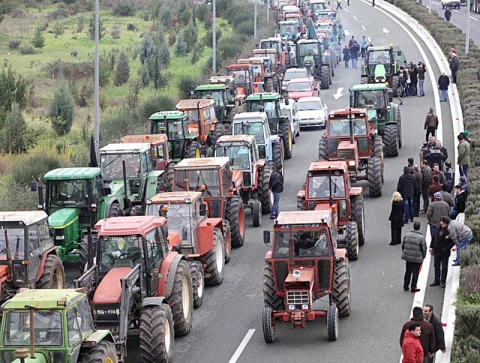The radical solution to the food-agricultural question can only be made in a revolutionary way

The pan-European farmers uprising brought the agri-food issue to the forefront of the political debate. This consists in the global explosion of the opposition between overproduction of food on the one hand, and hunger and poorly adulterated food on the other. World food production is now more than double the nutritional needs, with 7,000 calories per capita per day instead of 3,000. At the same time (according to Oxfam research), 11 people die of hunger every minute, or 16,000 a day, mostly children.
The farmers revolt in Europe is not a "bolt from the blue". The EU's Common Agricultural Policy (CAP) did not fall from the sky, it has been in place since 1961. It has always worked in favour of agri-food multinationals, industrialists and big-farm capitalists. According to Eurostat, in the 15 years 2005-2020, the implementation of the CAP has wiped out five million poor farmers (a reduction from 15 to 10 million), while the average agricultural area has increased from 117 to 170 hectares. According to a recent study by the European Parliament's Agriculture Committee on the future of European agriculture, by 2040 a further 62% reduction in the EU's farmers is predicted, from 10 to 3.9 million, with further concentration of agricultural land on farms of over 500 hectares - i.e. modern medieval-style landowners!
The main "tool" of the CAP for direct capitalist restructuring is the so-called "agricultural subsidies". The subsidies are paid for by the working class and all workers in the EU through VAT but they are collected by the agri-food industrialists and the big farmers! The 20% of EU big farmers own 90% of the land and receive 90% of the subsidies.
The new qualitative element of the pan-European peasant revolt is that the new CAP (2023-27) is much worse and brutally affects all farmers. In particular: (a) by inflating production costs, due to both the war in Ukraine and the energy crisis (b) by plummeting agricultural prices in the field and skyrocketing at the super market (c) the continuing huge duty-free agricultural imports from Ukraine and Latin America (EU-Mercosur trade agreement) and above all d) the subordination of the new CAP to the EU's Green Deal strategy. With a total cut in agricultural subsidies, their reorientation in favour of agri-food capital and big farmers and very strict, supposedly pro-environmental, new conditions of agricultural production. The 'green investments' to be financed by the EU will be carried out by those responsible for the environmental crisis, namely the multinational energy companies (private power generation, mining, wind turbines, transport infrastructure) and the agri-food sector.
At the same time the EU donates 50 billion euros to Zelensky (money of an annual cap), while in Greece the shipowners (who see their profits skyrocketing because of the wars) pay 0.50 euros/litre for oil and farmers 1.70 euros/litre!
The EU and its governments mock farmers with "understanding and respect", distracting the debate with alleged corrections, amendments and "national exemptions" from the new CAP. The pro-EU political consensus of bourgeois parties and the tragic absence of the anti-EU Left, lead to the dangerous and pan-European political rise of the far-right-fascist "Euroscepticism", which abuses and disables the anti-EU popular sentiments, wearing the costume of a phony "anti-systemism", ahead of the European elections. The far right supports the mainstream politics, fishing in murky waters by slandering other social movements and by racism against migrant workers whom it wants to be very cheap and without any rights. To fill the supermarkets of Western Europe they need cheap labour from Eastern Europe. In the recent health crisis the EU opened the closed borders to bring in seasonal workers for whom there was an exception to the travel ban to harvest the crops, proving that without migrant farm workers Europe will starve.
The survival of the peasant class requires and presupposes a common front of struggle of the poor peasantry, land workers and the working class for the abolition of the CAP and the total overthrow of the policy of governments, EU-NATO and capital. With an anti-capitalist-internationalist exit from the EU with a communist perspective. The radical solution to the contemporary food-agricultural question can only be made in a revolutionary way, by the working class, leading a workers-farmers class alliance. This is what Lenin taught us.
The enormous scientific and technical possibilities of our time create the material conditions for cheap, ecological and quality food for the people. The current anti-agricultural policy is in conflict with these possibilities. Creating a truly sustainable agriculture capable of feeding a growing world population means challenging the priorities of the global food system, the interests of big agribusiness and international institutions such as the World Bank, the IMF and the EU.
A long-term vision for sustainable agriculture cannot simply be a return to small-scale farming on a global scale. Only an agriculture rooted in collective ownership of land and means of production will be able to produce enough healthy food to feed the world sustainably in the long term. Today, poor middle-class farmers-fishermen-workers in the agricultural sector must defend their right to work and, by extension, to live with dignity in their own land, against governments and the aggressive agri-food capital. From this point of view, this struggle is a continuation and reinforcement of the struggle of the workers and unemployed in the cities against starvation-wages and flexible precarious working conditions.



















































